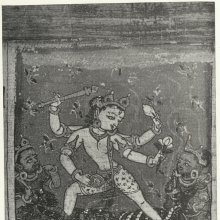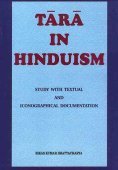Devimahatmya, Devīmāhātmya, Devi-mahatmya: 6 definitions
Introduction:
Devimahatmya means something in Hinduism, Sanskrit. If you want to know the exact meaning, history, etymology or English translation of this term then check out the descriptions on this page. Add your comment or reference to a book if you want to contribute to this summary article.
Images (photo gallery)
In Hinduism
Shaktism (Shakta philosophy)
Source: Brill: Śaivism and the Tantric Traditions (shaktism)Devīmāhātmya (देवीमाहात्म्य) (caṇḍīpāṭha) was often recited, as part of the Navarātra Tantric ritual (an autumnal festival of the warrior goddess Caṇḍikā).—Various 8th century sources refer to rituals such as reciting the Devīmāhātmya, for example: Devīpurāṇa, Kālikāpurāṇa, Kṛtyakalpataru, Durgābhaktitaraṅgiṇī, Durgāpūjātattva, Durgāpūjāviveka, Bhadrakālīmantravidhiprakaraṇa in Sanderson (2007); account of the Durgā Pūjā in Kelomal, West Bengal (Nicholas 2013).

Shakta (शाक्त, śākta) or Shaktism (śāktism) represents a tradition of Hinduism where the Goddess (Devi) is revered and worshipped. Shakta literature includes a range of scriptures, including various Agamas and Tantras, although its roots may be traced back to the Vedas.
General definition (in Hinduism)
Source: academia.edu: Tessitori Collection I (hinduism)Devīmāhātmya (देवीमाहात्म्य) is the name of a work dealing with Hymns and Rituals.—The Devīmāhātmya (in Sanskrit) is included in the collection of manuscripts at the ‘Vincenzo Joppi’ library, collected by Luigi Pio Tessitori during his visit to Rajasthan between 1914 and 1919.—The manuscript of the Devīmāhātmya contains the following material: devī-kavaca; argalā-stuti, kīlana-stuti; āvāhana. the main part of the Devīmāhātmya is made of three main episodes which are tales of the goddess’s divine exploits: Madhu and Kaiṭabha; Mahiṣāsura; Śumbha and Niśumbha. Then come the Gods’ praises, followed by prophecies of the goddess on her future intervention in the world, and an account of the merit gained by reciting the text. The second part of the codex has: laghu-stotra; dvārapāla-pūjā; bhairava-mantra.
Languages of India and abroad
Sanskrit dictionary
Source: Cologne Digital Sanskrit Dictionaries: Aufrecht Catalogus Catalogorum1) Devīmāhātmya (देवीमाहात्म्य) as mentioned in Aufrecht’s Catalogus Catalogorum:—or saptaśatī (q.v.), from Mārkaṇḍeyapurāṇa. [Mackenzie Collection] 73. Pet. 723. Io. 88. W. p. 141. Oxf. 43^b. 44^a. Cambr. 2. 3. Paris. (D 26. 27^a. 27^b. 255.). Tu7b. 14. Rādh. 26. 39. 41. NW. 498. Burnell. 192^b. 197^a. 203^b. P. 9. Bhk. 15. Poona. Ii, 96. 216. H. 36. Taylor. 1, 59. 109. 154. 286. 484. Oppert. 1466. 2182. 2619. 3797. 4550. 6000. 6804. 7441. Ii, 124. 2431. 2489. 2690. 4653. 5462. 6305. 6769. 7593. 7958. 8454. 10043. Rice. 84. 86 (and—[commentary]). 300. Peters. 1, 115. 2, 196.
—[commentary] Pheh. 2. Burnell. 197^b. Oppert. 2620. Bp. 294.
—[commentary] Daṃśoddhāra. Rādh. 26.
—[commentary] Saṃdehabhañjikā. Sb. 332.
—[commentary] by Ātmārāmavyāsa. NW. 252.
—[commentary] by Ānanda Paṇḍita. Oppert. Ii, 8103.
—[commentary] Anvayārthaprakāśikā by Ekanātha Bhaṭṭa. L. 2555.
—[commentary] Kavivallabha by Kāmadeva. L. 357.
—[commentary] by Kāśīnātha. NW. 250.
—[commentary] by Gadādhara Tarkācārya. L. 645.
—[commentary] by Gopīnātha. Oudh. Xiii, 44.
—[commentary] by Govindarāma. Sūcīpattra. 65.
—[commentary] Cidānandakelivilāsa by Gauḍapāda. Burnell. 197^b.
—[commentary] Vidvanmanoramā by Gaurīvara Śarman, com pleted by Rāmacandra Vācaspati. L. 326. 1242.
—[commentary] by Cakravartin. Pheh. 2.
—[commentary] Durgāmāhātmyāvabodhinī, composed by Caturbhujamiśra in 1412. Cambr. 2. L. 2175. Rādh. 26. Oudh. Xvii, 10. Peters. 2, 196. Quoted by Rāmanātha in Trikāṇḍaviveka.
—[commentary] by Jagaddhara. L. 2400. Oudh. Viii, 4.
—[commentary] by Jayanārāyaṇa. Peters. 3, 399.
—[commentary] Daṃśoddhāra by Jayarāma. K. 44.
—[commentary] by Nāgojī. Io. 88. L. 2576. Khn. 92. K. 54. B. 4, 258. Ben. 42. Pheh. 1. Rādh. 26. Np. Ii, 86. Burnell. 197^b. 202^b. Bh. 17. P. 9. Poona. Ii, 96. H. 36. Oppert. Ii, 8404. Peters. 1, 115.
—[commentary] by Nārāyaṇa. Kh. 66. Rādh. 26.
—[commentary] by Nṛsiṃha Cakravartin. Sūcīpattra. 65.
—[commentary] Durgāsaṃdehabhedikā by Pītāmbaramiśra. Ben. 42. NW. 202. Np. Ii, 86. Iii, 40.
—[commentary] Vijayā by Bhagīratha. L. 2407.
—[commentary] Guptavatī by Bhāskararāya. L. 2199. Khn. 94. K. 40. B. 4, 258. Rādh. 26. NW. 238. Oudh. Ix, 4. Xvii, 10. Np. Ii, 86. Oppert. 7052. 7439. Ii, 4555. Rice. 300. Peters. 1, 115.
—[commentary] by Bhīmasena. Pheh. 1. Oudh. X, 6.
—[commentary] by Raghunātha Maskarin. Oudh. X, 6.
—[commentary] by Ravīndra. Oudh. Viii, 4.
—[commentary] Caṇḍīṭīkāsaṃgraha by Rāmakṛṣṇa Śāstrin. Rādh. 26. NW. 188.
—[commentary] by Rāmānandatīrtha. L. 1045.
—[commentary] by Rāmāśrama. Oudh. Xiii, 36.
—[commentary] by Vidyāvinoda. Sūcīpattra. 65.
—[commentary] Caṇḍīślokārthaprakāśa Tattvadīpikā, composed by Virūpākṣa in 1531. L. 2149.
—[commentary] by Vṛndāvana Śukla. NW. 252.
—[commentary] by Śaṅkara Śarman. L. 2063.
—[commentary] by Śaṃtanu. Oxf. 44^a. L. 1698. Khn. 94. K. 54. Pheh. 2. Rādh. 26. P. 9.
—[commentary] by Śiva Bhaṭṭa. L. 609.
Devīmāhātmya has the following synonyms: Caṇḍī, Caṇḍīmāhātmya, Durgāmāhātmya.
2) Devīmāhātmya (देवीमाहात्म्य):—add Paris. (B 48. D 24). K. 54.
—[commentary] by Rāmāśrama. add Oudh. Ix, 4.
3) Devīmāhātmya (देवीमाहात्म्य):—from the Mārkaṇḍeyapurāṇa. Aberdeen University. Bl. 201. Fl. 41 (and—[commentary]). 42 ([fragmentary]). Hz. 263. Rgb. 134. 184. Stein 212.
—[commentary] Bhāgīrathī. Stein 212.
—[commentary] Devīmāhātmyāvabodhinī by Caturbhujamiśra. Fl. 42 ([fragmentary]). Quoted by Śiva, L. 3319.
—[commentary] by Dhṛtidāsa. Quoted by Śiva, L. 3319.
—[commentary] by Nāgojī. Hz. 332. Rgb. 184. Stein 212. 213.
—[commentary] Guptavatī by Bhāskararāya. Devīpr. 79, 6.
—[commentary] by Rāmāśrama (or Raghunāthāśrama). Stein 213.
—[commentary] by Śaṃtanu. Bl. 202. Rgb. 134.
—[commentary] Devīmāhātmyacandrikā by Śiva. L. 3319.
4) Devīmāhātmya (देवीमाहात्म्य):—from the Mārkaṇḍeyapurāṇa. Ulwar 2172.
—[commentary] by Gadādhara. Ulwar 2173. Extr. 632.
—[commentary] by Nārāyaṇa, son of Nṛsiṃha. Ulwar 2174. Extr. 633.
—[commentary] Guptavatī by Bhāskararāya. Ulwar 2176.
—[commentary] by Bhīmasena, grandson of Muralīdhara. Ulwar 2180. Extr. 639.
—[commentary] by Raghunātha Bhāskara. Ulwar 2177. Extr. 636.
—[commentary] Puṣpāñjali by Lālamaṇi, son of Nanda Śarman. Ulwar 2178. Extr. 637.
—[commentary] Caṇḍīprasādinī by Sabhācandra, son of Trilocana. Ulwar 2175. Extr. 634.
5) Devīmāhātmya (देवीमाहात्म्य):—from the Mārkaṇḍeyapurāṇa. Ak 248. Bd. 151 ([fragmentary]). Cr. Hz. 1098 (inc). 1314. Io. 88. 824. 1067. 2240. 2247. 2258. 2415. 3214. 3234. 3237. Jl. L.. 299. 300. Peters. 6, 528. Rep. p. 5. Śg. 2, 294. Whish 41. C. [anonymous] L.. 301. Peters. 5, 573. C. Guptavatī by Abhinavagupta. Ak 249. C. Siddhāntamañjarī by Kṛṣṇānanda. Hpr. 1, 177. C. by Gadādhara Tarkācārya. L.. 299. C. Tattvaprakāśikā by Gopāla, son of Durgādāsa. Cs 2, 527. Hpr. 1, 178. C. by Gopālamiśra. Hpr. 1, 179. C. by Govindarāma. Hpr. 1, 180. 2, 104. C. Vidvanmanoramā by Gaurīvara. Hpr. 1, 185. C. by Jagaddhara, son of Ratnadhara. Io. 2926. C. by Narasiṃha Cakravartin. Hpr. 1, 181. C. Devīmāhātmyamañjarī by Narasiṃha Cakravartin. As p. 85. Hpr. 1, 182. C. by Nāgojī. Ak 248. As p. 84. Io. 88. 1588. L.. 302. Peters. 5, 574. C. by Nārāyaṇa. Bd. 151 ([fragmentary]). C. Durgāsaṃdehabhedikā by Pītāmbara. As p. 84. C. Guptavatī by Bhāskararāya, son of Gambhīrarāya. Cs 4, 28. C. Tātparyakaumudī by Raghunātha Cakravartin. Hpr. 1, 184. 2, 105. C. by Raghunātha Maskarin. Io. 824. Called by Peterson Ulwar 2177 Raghunāthabhāskara. C. Kaumudī by Rāmakṛṣṇa. Hpr. 1, 175. C. Saptaśatīviveka by Rāmacandra Vācaspati. Hpr. 1, 186. C. Tattvāvabodhinī by Vidyāvinoda. Cs 4, 29. 304. Hpr, 1, 183. C. Candrikā by Śiva. As p. 85. Hpr. 1, 17. Durgārahasya. Bd. 150. Rahasyatraya. Three supplementary chapters to the Devīmāhātmya. L.. 300. 303.
Devīmāhātmya has the following synonyms: Caṇḍīmāhātmya.
Source: Cologne Digital Sanskrit Dictionaries: Monier-Williams Sanskrit-English DictionaryDevīmāhātmya (देवीमाहात्म्य):—[=devī-māhātmya] [from devī > deva] n. Name of [chapter] of [Mārkaṇḍeya-purāṇa]
[Sanskrit to German]
Sanskrit, also spelled संस्कृतम् (saṃskṛtam), is an ancient language of India commonly seen as the grandmother of the Indo-European language family (even English!). Closely allied with Prakrit and Pali, Sanskrit is more exhaustive in both grammar and terms and has the most extensive collection of literature in the world, greatly surpassing its sister-languages Greek and Latin.
See also (Relevant definitions)
Partial matches: Devi, Mahatmya, Tevi.
Starts with: Devimahatmyamantravibhagakrama, Devimahatmyapathavidhi.
Ends with: Rajnidevimahatmya, Ranadevimahatmya, Shiladevimahatmya.
Full-text (+247): Candipatha, Kinjalkin, Naramala, Kalimahatmya, Candikamahatmya, Tuhinacala, Grahapida, Devayoni, Durgamahatmya, Graiveyaka, Ayattata, Devimahatmyamantravibhagakrama, Devimahatmyapathavidhi, Argalastuti, Ksharaka, Ranadevimahatmya, Rajnidevimahatmya, Kirtana, Sharadadevimahatmyapatala, Kaushambhas.
Relevant text
Search found 12 books and stories containing Devimahatmya, Devīmāhātmya, Devi-mahatmya, Devī-māhātmya; (plurals include: Devimahatmyas, Devīmāhātmyas, mahatmyas, māhātmyas). You can also click to the full overview containing English textual excerpts. Below are direct links for the most relevant articles:
The Markandeya Purana (Study) (by Chandamita Bhattacharya)
1.13: Review of Literature < [Chapter 1]
1.8: An Introduction of the Mārkaṇḍeya-purāṇa < [Chapter 1]
Śaktism (worship of Śakti as the female goddess) < [Chapter 4]
The Concept of Durga in Mahabalipuram < [July – September 1976]
The Concept of Durga in Mahabalipuram < [October - December 1976]
Reviews < [April 1969]
The Markandeya Purana (by Frederick Eden Pargiter)
Canto XCIII - The Devī-māhātmya (concluded)
Canto LXXXVI - The Devī-Māhātmya: The slaying of Dhūmralocana
The validity of Anumana (inference) in Nyaya system (by Babu C. D)
Puranic encyclopaedia (by Vettam Mani)
Pallava period (Social and Cultural History) (by S. Krishnamurthy)
Scheme of Pallava Sculptures < [Chapter 2 - Origin of Sculptural Art—Its Development and Scheme]
Related products


